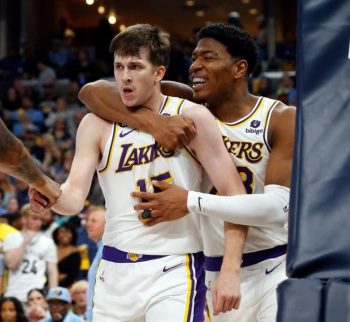NBA
Thanasis Antetokounmpo and Deni Avdija explain why some European players never adapt to the NBA

This Wednesday, Thanasis Antetokounmpo invited Wizards forward Deni Avdija on his “Thanalysis” podcast, and mostly used their own examples talk about the reasons why many European talents find it hard to adapt to the NBA’s basketball culture.
The Bucks’ foward began by asking the Israeli star is they had ever encountered each other outside of the United States, and Avdija remembered one clash back when he played for Maccabi.
“I played with you, you played in Panathinaikos,” Avdija recalled. “I remember that. You also had a crazy dunk versus us. I remember that because I was on the bench, I was not playing.”
To watch the whole conversation, check out the full episode of the Milwaukee player’s podcast:
Naturally, the conversation switched to talk about the contrasts between each continent’s basketball game.
“That’s crazy,” Antetokounmpo said. “I tell people there is so much talent in Europe. For example, here [in the NBA], if you are out of the rotation, they have a plan for you or because it is what it is, like playoffs or whatever. But back home, it’s a hierarchy, you are just not playing because you are young a lot of times. Most of the time.”
To what the Washington player responded: “If you are on the team, you are probably going to play. But I agree with you.”
The 30-year-old Greek athlete then shared a more analytic take on why so many talents from abroad struggle to showcase their abilities once they step on NBA courts. He considers physicality to be one of the main factors.
“That’s a whole package,” he said. “The number one is the body type, the physicality. For example, here in the NBA, you don’t have the same bodies as in Europe. Let’s say you have a guy like [Walter] Tavares from Real Madrid. In Europe, you have one guy like Tavares. In the NBA, you have like six or seven guys like him.”
Another reason is the different playing styles in Europe, as Antetokounmpo assures that he’s only witnessed a limited amount of athletes who are versatile and play many positions at once. He believes the Euroleague still depende on role players, unlike stars in the United States who have a broader skill set.
“In Europe, you have maybe two or three guys who play like point forwards — [Will] Clyburn, Sasha Vezenkov, Chris Singleton. You have specific guys who play the four and can dribble and create. In the U.S., everybody. There are no positions,” he said.
Both players agreed that the mental aspect is crucial to adapt to another sport culture
The podcast host couldn’t stress enough how important the mental aspect of it all is to a player’s adaptation to a new country and style of play. “But it’s hard. The mental part matters so much,” Antetokounmpo expressed.
“It matters the most,” Avdija added. “People don’t understand that. In the NBA, everybody is talented to an extent. Some guys are more talented, some guys are less. Everybody got talent, right? What’s the other layer you have? That’s what separates the good from the average. Extra stuff like mentality, work ethic, and all that stuff.”
The Israeli star admits that professional basketball in the United States is a filter that separates the great from the good.
“Everybody who comes to the NBA is talented, they are good players, everybody can score,” he mentioned. “It is that next step, that small details that we talked about. I think this stuff separates the great from the good and the average. And, of course, consistency.”














